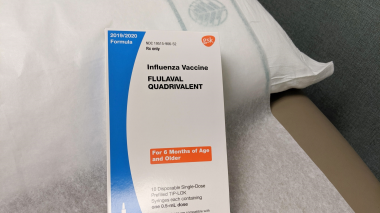Flu (Influenza)
The flu comes every year and can infect anyone. That’s why it’s so important to stay aware and be prepared. Whether you’re getting your flu shot, looking for care or just have a few questions, Atrium Health is here for you all season long.
Keep reading to learn how to stay healthy and what to do if you get sick.
Is it COVID or the flu?
Learn more about the flu and how to prevent seasonal illness.
Get flu care now
When you’re sick with the flu, you just want to feel better. For convenient care, try one of our options below. If you have any life-threatening flu symptoms, call 911 or visit the nearest emergency room right away.
Frequently asked questions
Here are some things to know about the flu, how to prevent it and what to do if you get sick.
Caused by influenza viruses, the flu is a disease that affects the lungs and parts of the respiratory system. Flu outbreaks are most common during late fall, winter and early spring.
Common flu symptoms include:
- Fever or chills
- Headaches
- Cough
- Sore throat
- Stuffy or runny nose
- Muscle or body aches
- Tiredness
- Nausea, vomiting or diarrhea
Severe flu-related complications, such as pneumonia, respiratory failure or even death, may occur in some cases. The flu may also make chronic medical conditions worse. If you have any underlying conditions, talk to your doctor to see if your condition raises your risk for flu complications.
Some flu symptoms can look like COVID-19 or even a cold. See the difference in symptoms, or start a risk assessment if you think you might have COVID-19.
First, and most importantly: Get a flu shot as soon as it is available. Schedule with your Atrium Health doctor, or find a doctor now.
In addition to getting vaccinated and taking care of yourself, you should take everyday actions that can help prevent the flu. The Centers for Disease Control and Prevention (CDC) recommends following these steps to protect your health:
- Cover your nose and mouth with a tissue when you cough or sneeze.
- Wash your hands often with warm water and soap for 15 to 20 seconds. If soap and water are not available, use alcohol-based hand sanitizers.
- Disinfect frequently touched objects and surfaces, such as doorknobs, desks, keyboards and phones.
- Avoid touching your eyes, nose or mouth.
- Try to avoid close contact with sick people.
Visit cdc.gov/flu for more information and resources.
The best time to get your flu shot is as soon as it’s available, usually in September and October.
According to the Centers for Disease Control and Prevention, the flu shot can reduce your risk of getting the flu by between 40% and 60%. It’s also been shown to reduce the severity of illness if you do get sick, as well as the risk of complications and hospitalization.
Even if you have had the flu, you should still get your flu shot, because you could get the flu again.
If you get flu-like symptoms, avoid contact with others and stay home as much as possible, except for medical care or other necessities.
If you’re concerned about your symptoms, make an appointment with your primary care provider, or try one of our other convenient care options. Your provider will determine if flu testing or treatment is needed.
In children, emergency warning signs that need urgent medical attention include:
- Fast breathing or trouble breathing
- Bluish skin color
- Not drinking enough fluids
- Not waking up or not interacting
- Being so irritable that the child does not want to be held
- Flu-like symptoms improve but then return with fever and worse cough
- Fever with a rash
In adults, emergency warning signs that need urgent medical attention include:
- Difficulty breathing or shortness of breath
- Pain or pressure in the chest or abdomen
- Sudden dizziness
- Confusion
- Severe or persistent vomiting
People with influenza should be considered contagious as long as they have symptoms and possibly for up to 7 days after getting sick. Children, especially younger children, and immunocompromised individuals may be contagious for longer periods.
In addition, we know that some viruses and bacteria can live for 2 hours or longer on surfaces like tables, doorknobs, light switches and desks. It’s important to keep these frequently touched surfaces clean. Frequent handwashing will also help you reduce the chance of catching the flu from surfaces.
If medically necessary, antiviral drugs are available to treat influenza. However, most people with mild flu cases do not require antiviral drugs.
Antiviral drugs are a kind of medicine used specifically to treat viral infections. They should only be considered for those sick enough to be hospitalized or those at a higher risk for complications due to an underlying condition.
Since the flu is a virus, your doctor will not prescribe antibiotics. Learn more about when antibiotics are prescribed.
Flu viruses are spread mainly from person to person, usually through droplets when an infected person coughs, sneezes or talks. Sometimes people become infected by touching something with flu viruses on it, then touching their mouth or nose.
Schedule a flu shot or get care
Find a doctor now, and schedule an appointment at a location near you. Use the filters to narrow your search.



